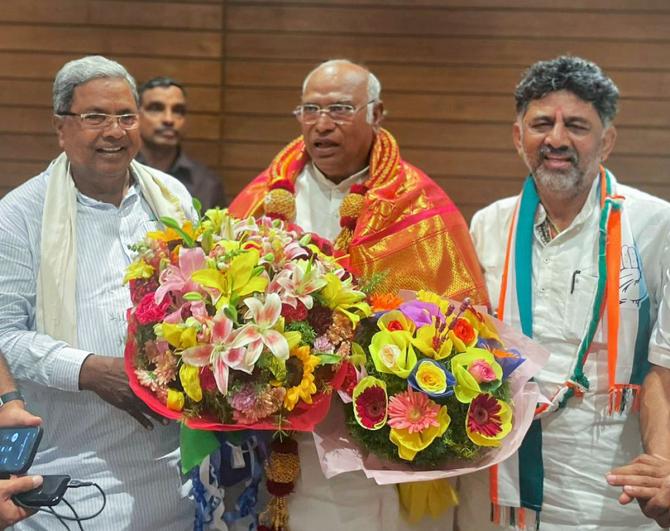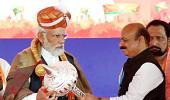'Both the BJP and Congress will make every effort to break the JD-S.'

"The Congress thought it would use caste to defeat the BJP's politics, but the various caste groups in the region had already been intoxicated by the BJP's agenda," says A Narayana, professor of public policy and governance at the Azim Premji University, Bengaluru.
Professor Narayana was the Karnataka state coordinator for the World Bank's Land Governance Assessment Framework Project and a consultant for the Karnataka government's high-power committee on restructuring the governance of Bengaluru city. He was also member of the technical committee constituted by the Election Commission of India to promote electoral literacy in India.
"In Karnataka, the BJP faces a dilemma about the manner in which to pursue Hindutva -- whether it should be hardline Hindutva or should it be Hindutva in small doses," Professor Narayana says in the concluding part of a phone interview with Rediff.com's Archana Masih.
Does this election result mean that BJP's Hindutva politics will be suppressed temporarily in Karnataka or will it provoke the BJP to promote a more hardline Hindutva?
Despite losing this election, the party's vote share has remained unchanged at 36 per cent. This shows that the BJP's Hindutva politics continues to have a huge patronage in Karnataka.
The BJP's defining character is Hindutva. The party's political strategy is based on a combination of Hindutva and development.
Development can be provided by any other political formation, but the combination of development+Hindutva offers a fatal attraction for a large constituency of people. Therefore, the BJP cannot do without Hindutva.
However, in Karnataka the BJP faces a dilemma about the manner in which to pursue Hindutva -- whether it should be hardline Hindutva or should it be Hindutva in small doses.
The challenge in the first option is that the Lingayats, their largest social constituency, will not be comfortable with virulent Hindutva. They do not vote for the BJP because of communal politics, but because it suits their purpose.
They have a great working relationship with the BJP, but when the party starts homogenising society in the name of Hindutva, the Lingayats risk losing their identity and will resist such a move.
Now, Karnataka is very aware of the BJP's strategy. Several organisations emerged before the elections to galvanise people against communal polarisation. Many movements that were lying dormant for years suddenly showed revival because the BJP's polarisation campaign was going out of control.
Therefore, the BJP's strategy to push Hindutva in small measures will not go unchallenged in the future.
What is the future of the JD-S? Will there be an exodus of JD-S MLAs to the Congress?
The JD-S is facing the biggest crisis since its inception. It fought its first election in 1999 and hasn't faced such a challenge in 20 years.
However, I will not hasten to write it off because it has faced lows in the past too and has somehow survived. Mr H D Deve Gowda has aged and though his son H D Kumaraswamy is a leader in his own right, the JD-S needs to reinvent itself and move beyond being a family-centric party.
Most regional parties are family-centric, but those parties stand for something, meanwhile, the JD-S does not have any defining ideology.
There is a huge constituency in Karnataka which wants a centrist third alternative, especially in Old Mysore. In the absence of such a party, they will be taken over by the BJP.
Both the BJP and Congress will make every effort to break the JD-S.

What makes coastal Karnataka such a strong BJP bastion?
The region has a very complex socio-economic profile and political trajectory. That is the region where Hindutva+Development has taken deeper roots.
Communal polarisation, development mantra and larger than life image of Narendra Modi are the three narratives that have found a lot of traction in the two districts of coastal Karnataka which happen to be Karnataka's most economically and educationally advanced region.
The Congress thought it would use caste to defeat the BJP's politics, but the various caste groups in the region had already been intoxicated by the BJP's agenda.
If the Congress wants to take them on without offering an alternate ideological antidote, then it has to win over the Billavas, which is the largest caste in that region.
But the Congress has a limitation because that area also has a large minority population and other OBC castes. If it puts all its eggs in the Billavas's basket, then the other castes will get alienated.
The BJP can afford to do that because it does not have to accommodate the minorities, but because of its philosophy, the Congress has to also accommodate Christians and Muslims that have a considerable presence in the region.
That may be the reason why the Congress fielded only one Billava candidate this time and the Billavas decided to continue to support the BJP.

Corruption was an issue with the 40% tag on the BJP government. How can the Congress escape such a reputation, especially with the Lok Sabha election coming up and as pressure to raise funds intensifies?
The Indian electorate is very understanding. It knows that political parties resort to illicit means to raise funds to finance elections. Corruption does not figure prominently in the minds of the people when they go to vote.
There is a perception that all parties are corrupt.
The BJP discredited the Congress so much for corruption that if the Congress takes up the issue of corruption, it will help the BJP. People believe that no Opposition party, especially the Congress, has the moral authority to question corruption.
Corruption was the defining character of the outgoing government party; every week there were new charges. The Congress and the JD-S used corruption in a big way in the election campaign to corner the ruling party.
However, we do not have evidence to show that corruption played a role in making the people reject the BJP. At least two pre-poll surveys suggested that corruption was not one of the main issues based on which they made their electoral choice.

Who, according to you, are the leaders to look out for in the state?
Political parties are not institutional anymore, they are increasingly centered around individuals.
There are three mass leaders in Karnataka -- Siddaramaiah, B S Yediyurappa and H D Kumaraswamy. The first two are nearing the end of their political careers whereas Kumaraswamy's appeal is limited largely to the Vokkaliga heartland in Southern Karnataka.
D K Shivakumar is known more for his organisational skills and as a trouble shooter in the Congress. He is yet to grow as a mass leader.
Feature Presentation: Aslam Hunani/Rediff.com











 © 2025
© 2025